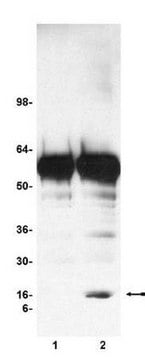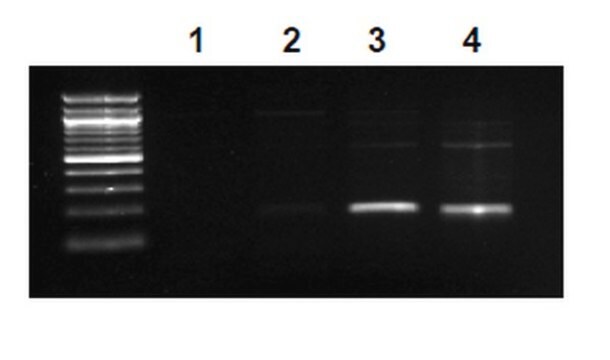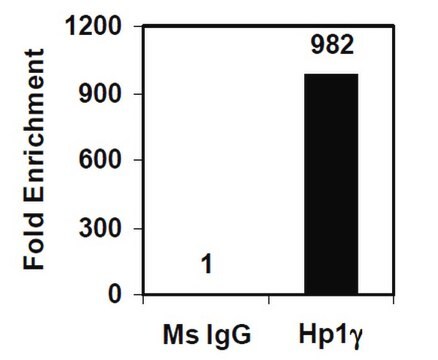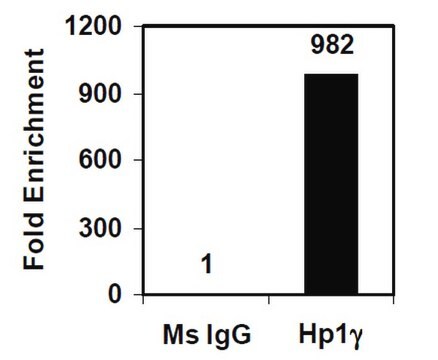17-409
EZ-Magna ChIP® G - Chromatin Immunoprecipitation Kit
Single day chromatin immunoprecipitation (ChIP) kit containing all necessary reagents to perform 22 individual chromatin immunoprecipitation (ChIP) reactions using magnetic G beads. Control primers included.
동의어(들):
Magnetic ChIP Kit, Magnetic Chromatin Immunoprecipitation
로그인조직 및 계약 가격 보기
모든 사진(1)
About This Item
UNSPSC 코드:
12161503
eCl@ss:
32161000
NACRES:
NA.52
추천 제품
일반 설명
Chromatin Immunoprecipitation (ChIP) is a powerful technique for mapping the in vivo distribution of proteins associated with chromosomal DNA. These proteins can be histone subunits and post-translational modifications or other chromatin associated proteins such as transcription factors, chromatin regulators, etc. Additionally, ChIP can be used to identify regions of the genome associated with these proteins, or conversely, to identify proteins associated with a particular region of the genome. ChIP methodology often involves protein-DNA and protein-protein cross-linking, fragmentation of the cross-linked chromatin, and subsequent immunoprecipitation of chromatin with an antibody specific to a target protein. The DNA fragments isolated in complex with the target protein can be identified by a variety of methods including PCR, DNA microarray and DNA sequencing. Standard or quantitative PCR can be performed to verify whether a particular DNA sequence (the gene or region of the genome) is associated with the protein of interest. The combination of ChIP and promoter or genomic tiling microarrays (ChIP-chip) allows genome-wide identification of DNA-binding sites for chromatin-associated proteins with precise resolution. Alternatively, high-throughput sequencing of libraries constructed from immunoprecipitated chromosomal DNA (ChIP-Seq) is a powerful alternative to ChIP-chip in mapping the protein-DNA interactions across mammalian genomes.
Chromatin Immunoprecipitation (ChIP) is an important technique allowing the researcher to analyze in vivo interactions of proteins with genomic DNA. Any chromatin-associated or DNA binding protein can be analyzed with this technique, provided a good antibody to the protein exists. One can measure different proteins localized to a specific region of the genome, or the genome wide distribution of a specific protein. Another powerful application of this technique is to analyze changes in histone modifications that correlate with processes like transcription, mitosis or DNA repair.
Features & Benefits:
Faster: Magnetic protein G beads allow for the entire ChIP protocol to be done in as little as a day! All reagents to process your samples are included - you don′t have to spend valuable time making them.
Easier: Spin columns make DNA purification easier and more reliable - no more messy phenol-chloroform extractions.
Greater Reproducibility: Positive and negative control antibodies and PCR primers are included to help validate your results and to troubleshoot your experiments.
Features & Benefits:
Faster: Magnetic protein G beads allow for the entire ChIP protocol to be done in as little as a day! All reagents to process your samples are included - you don′t have to spend valuable time making them.
Easier: Spin columns make DNA purification easier and more reliable - no more messy phenol-chloroform extractions.
Greater Reproducibility: Positive and negative control antibodies and PCR primers are included to help validate your results and to troubleshoot your experiments.
애플리케이션
Used to detect/quantify: Protein G
포장
Kit capacity: 22 chromatin immunoprecipitation assays
성분
Magnetic Protein G Beads
ChIP Dilution Buffer
Low Salt Wash Buffer
High Salt Wash Buffer
LiCl Wash Buffer
TE Buffer
Cell Lysis Buffer
Nuclear Lysis Buffer
ChIP Elution Buffer (w/o Proteinase K)
10X Glycine
10X PBS
Protease Inhibitor Cocktail II
Proteinase K
Control Primers
Anti-RNA Polymerase II
Normal Mouse IgG
Spin Filters
Collection Tubes
Bind Reagent A
Wash Reagent B
Elution Reagent C
ChIP Dilution Buffer
Low Salt Wash Buffer
High Salt Wash Buffer
LiCl Wash Buffer
TE Buffer
Cell Lysis Buffer
Nuclear Lysis Buffer
ChIP Elution Buffer (w/o Proteinase K)
10X Glycine
10X PBS
Protease Inhibitor Cocktail II
Proteinase K
Control Primers
Anti-RNA Polymerase II
Normal Mouse IgG
Spin Filters
Collection Tubes
Bind Reagent A
Wash Reagent B
Elution Reagent C
물리적 형태
Two boxes containing all necessary reagents to perform 22 individual chromatin immunoprecipitation (ChIP) reactions. Supplied buffers are sufficient to generate chromatin from up to five 15 cm plates of cultured cells, each plate providing up to 10 chromatin preparations (varies with cell and assay type).
저장 및 안정성
Upon receipt, store components at the temperatures indicated on the labels. Kit components are stable for 1 year from date of shipment when stored as directed.
법적 정보
MAGNA CHIP is a registered trademark of Merck KGaA, Darmstadt, Germany
면책조항
Unless otherwise stated in our catalog or other company documentation accompanying the product(s), our products are intended for research use only and are not to be used for any other purpose, which includes but is not limited to, unauthorized commercial uses, in vitro diagnostic uses, ex vivo or in vivo therapeutic uses or any type of consumption or application to humans or animals.
신호어
Danger
유해 및 위험 성명서
Hazard Classifications
Acute Tox. 4 Oral - Aquatic Chronic 3 - Eye Irrit. 2 - Flam. Liq. 2 - Skin Irrit. 2
Storage Class Code
3 - Flammable liquids
Flash Point (°F)
55.4 °F
Flash Point (°C)
13 °C
시험 성적서(COA)
제품의 로트/배치 번호를 입력하여 시험 성적서(COA)을 검색하십시오. 로트 및 배치 번호는 제품 라벨에 있는 ‘로트’ 또는 ‘배치’라는 용어 뒤에서 찾을 수 있습니다.
Magdalena M Przybycien-Szymanska et al.
PloS one, 6(10), e26647-e26647 (2011-11-01)
EtOH exposure in male rats increases corticotropin-releasing hormone (CRH) mRNA in the paraventricular nucleus of the hypothalamus (PVN), a brain region responsible for coordinating stress and anxiety responses. In this study we identified the molecular mechanisms involved in mediating these
Heat shock factor 1 upregulates transcription of Epstein-Barr Virus nuclear antigen 1 by binding to a heat shock element within the BamHI-Q promoter.
Wang, FW; Wu, XR; Liu, WJ; Liao, YJ; Lin, S; Zong, YS; Zeng, MS; Zeng, YX; Mai, SJ; Xie, D
Virology null
Overexpression of Rap-1A indicates a poor prognosis for oral cavity squamous cell carcinoma and promotes tumor cell invasion via Aurora-A modulation.
Chen, CH; Chuang, HC; Huang, CC; Fang, FM; Huang, HY; Tsai, HT; Su, LJ; Shiu, LY; Leu, S; Chien, CY
The American Journal of Pathology null
Cheng-Wei Yang et al.
Carcinogenesis, 34(6), 1304-1314 (2013-02-07)
Tylophorine, a phenanthroindolizidine alkaloid, is the major medicinal constituent of herb Tylophora indica. Tylophorine treatment increased the accumulation of c-Jun protein, a component of activator protein 1 (AP1), in carcinoma cells. An in vitro kinase assay revealed that the resultant
COUP-TFII controls amygdala patterning by regulating neuropilin expression.
Tang, K; Rubenstein, JL; Tsai, SY; Tsai, MJ
Development null
자사의 과학자팀은 생명 과학, 재료 과학, 화학 합성, 크로마토그래피, 분석 및 기타 많은 영역을 포함한 모든 과학 분야에 경험이 있습니다..
고객지원팀으로 연락바랍니다.










